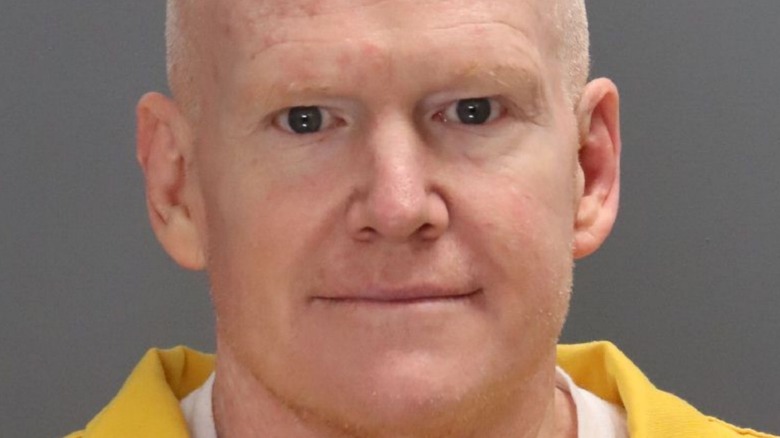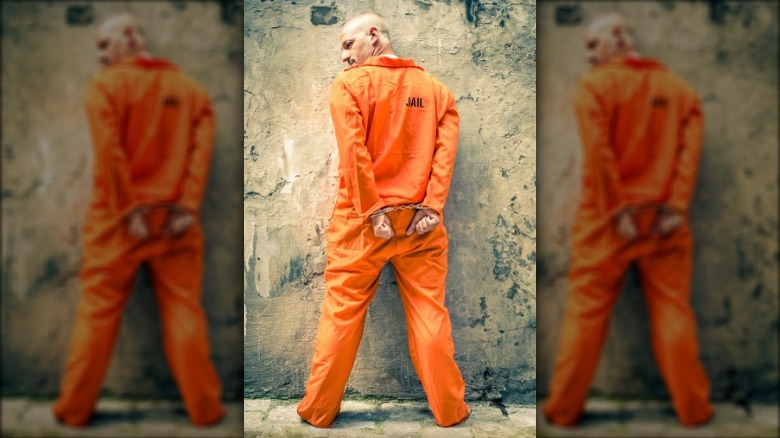Why Some Inmates Have To Shave Their Heads Before Entering Prison
After two consecutive life sentences were handed down for the 2021 murder of his wife and son, Maggie and Paul Murdaugh, a mugshot emerged of disbarred South Carolina lawyer, Alex Murdaugh, looking strikingly different from his last courtroom appearance. The picture was taken as Murdaugh checked in to the Kirkland Reception and Evaluation Center in South Carolina where Murdaugh will be evaluated before he is assigned a permanent prison location. Notably, Murdaugh's head was shaved in the photo, which is a common practice for some but not all prison systems. In the photo, the former lawyer also wore a yellow jumpsuit, similar to the beige jail-issued jumpsuit he wore in his last courtroom appearance.
There are a few reasons why people's heads are shaved before they enter prison in some areas. First of all, for hygiene considerations, but also, to help prepare them for the psychological and emotional reality of their life behind bars. In many areas having a convicted person's head shaved during prison intake is required by law. Hair is an important symbol, with religious significance in some cultures, and for this reason, the requirement that people in prison have their heads shaved has become controversial among certain incarcerated populations in some states (via NBC News).
According to the website dedicated to the Stanford Prison Experiment, head shaving is a means to forced conformity, erasing the individuality people evoke through hairstyles. It's also the kick-off to years of "arbitrary, coercive rules" that make up life in prison. All that said, it seems that the practice in the U.S. only applies to people entering men's prisons.
Justifications and security concerns
Though no federal law mandates the practice, state prisons make their own rules. In fact, the Federal Bureau of Prisons does not require head shaving for incarcerated people, and they can choose how they want to wear their hair and even have it long as long as they keep it clean and hygienic. However in South Carolina, for instance, after a man's head is shaved upon intake, during his years in incarceration he can not grow it out past an inch long, according to that state's department of corrections.
Still, there are a few practical reasons people have their heads shaved behind bars in some legal systems. In close-quarter prison settings, shaved heads help prevent the spread of lice and cut down on other hygiene issues, The Virginian-Pilot writes. Illicit items like drugs and weapons can also be hidden in long hair and beards, and a distinctive hairstyle or facial hair can provide an easy means for imprisoned people to change their appearance should they escape.
Speaking with NBC News, New York State Corrections Department head Harold Clarke said in 2011, "We're not doing it just because we can. It's been done because it raises some security issues and concerns."
Head shaving is just one aspect of how some prison systems take a person out of society and work to mold them into their new roles as people whose names are replaced by numbers. The various rigors of prison intake are the first steps in forcing people convicted of serious crimes to emotionally and psychologically adjust to their new life of incarceration.
The Prison Look?
As VICE writes, in some parts of the world, shaved heads have become part of a "look" among some world prison populations. But as mentioned earlier, in some religions, such as Rastafarianism, long hair has religious significance and for this reason, shave-head policies have been challenged as religious persecution. Speaking with NBC News, one Rastafari New York state inmate likened shaved heads behind bars, among other policies, a form of "psychological warfare."
On those grounds, in 2009, Prison Legal News reported that New York's state's head-shaving policy was ruled unconstitutional, but in South Carolina, where convicted murderer Alex Murdaugh is sentenced to life behind bars, in 1999, the state's requirement that prisoners maintain short hair and remain cleanly shaven was upheld, Prison Legal News elsewhere notes. At Kirkland Reception and Evaluation Center, once his head was shaved, Murdaugh would also undergo medical and psychological testing among types of assessment.
On Murdaugh's new life in prison, trial attorney Robert Rikard called Kirkland Reception and Evaluation Center a "brutal environment," in a tweet, writing Murdaugh's future will be "quite a shock after the privileged life he has lived." According to Rikard, Murdaugh was assigned to the maximum-security South Carolina Department of Corrections facility, "because [Murdaugh's] convicted of a violent crime, he will go to a facility that only houses the violent criminals. The worst of the worst."


